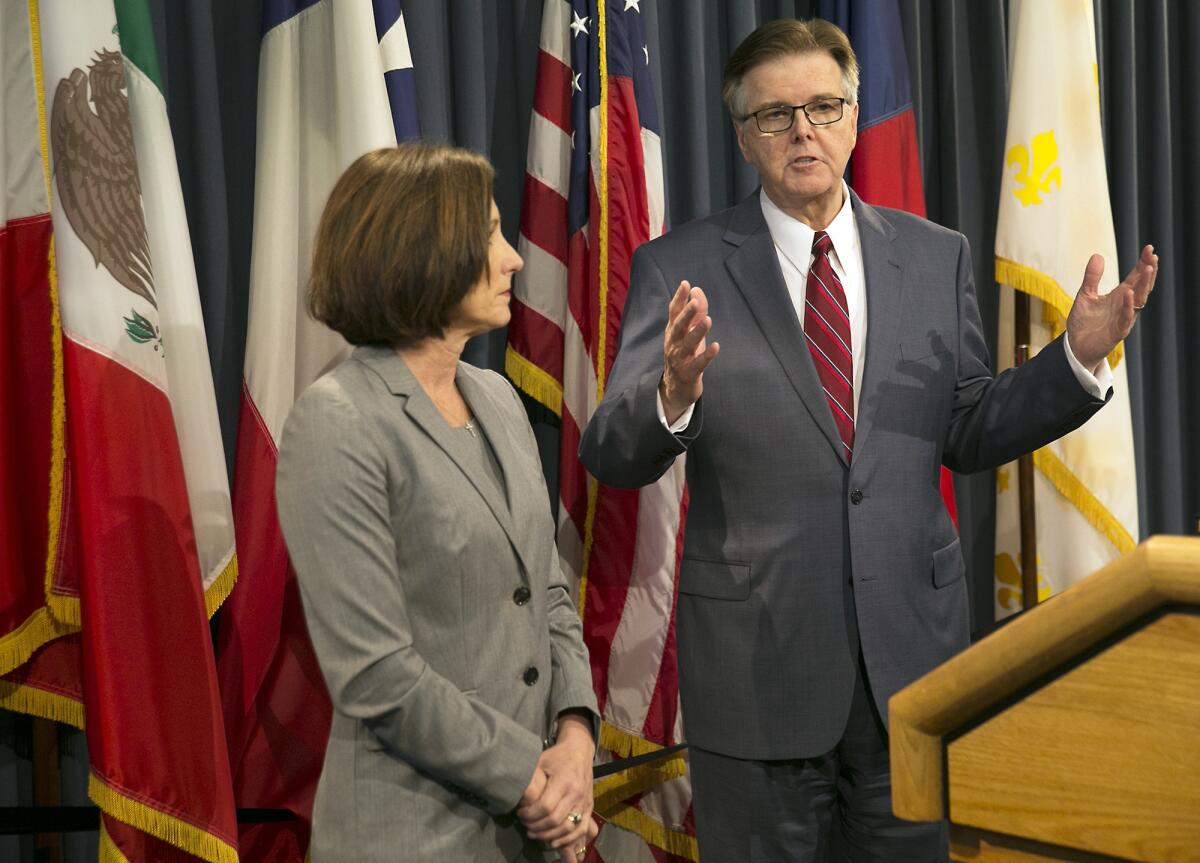Texas may be in for a fight over transgender bathrooms like the one raging in North Carolina

It cost North Carolina jobs and revenue as business and sports leagues launched boycotts. But that hasn’t deterred Texas.
Top Republicans there now want to follow North Carolina and ban transgender people from using the bathrooms of the gender they identify with.
This week state Sen. Lois Kolkhorst, a Republican from rural Brenham, filed Senate Bill 6, known as the Texas Privacy Act, which would require people to use the bathroom or locker room according to the gender on their birth certificates.
If approved by the state Legislature, it would also bar local governments from passing ordinances designed to protect gay or transgender rights in public restrooms. School districts or state agencies found in violation could be fined up to $1,500 for offenses. All privately owned businesses would be exempt from the measure.
Texas Lt. Gov. Dan Patrick lauded the effort as the “right thing to do.”
“We know it’s going to be a tough fight,” he said at a news conference this week introducing the bill. “The forces of fear and misinformation will pull out all the stops.”
In recent weeks, lawmakers from Kentucky and Virginia have also floated similar measures, despite the fallout that North Carolina has faced since March, when it became the only state with such a law.
Last year, Texas was among nearly a dozen states that sued the Obama administration over federal guidance directing schools to allow transgender students to use restrooms and other facilities that match their gender identities. A federal judge issued a temporary injunction, which remains in place.
In a University of Texas/Texas Tribune poll from October, 51% of respondents in the state said transgender people should use the facilities that match their birth gender, while 31% said it should be based on gender identity. The rest said they did not know.
In response to North Carolina’s restriction on bathroom use, corporations, sports leagues and artists boycotted holding events in the state. Charlotte, the state’s largest city, lost nearly $100 million when the NBA moved its 2017 All-Star Game to New Orleans, city officials estimated.
Last month, lawmakers in North Carolina held a special legislative session to consider repealing the law, but the effort faltered.
The nonpartisan Texas Assn. of Business conducted a study on potential economic impact such a measure would have in Texas, concluding that it could cost the state between $964 million and $8.5 billion in the first year, with tourism taking the a large hit.
“Texas would put itself at substantial economic and social risk if state legislators passed legislation that is seen as discriminatory,” its report said.
Patrick dismissed such arguments.
“It’s just more talk from the opponents who have nothing else to say,” he said.
He noted that the Super Bowl will be played in Houston next month even though the city overwhelmingly rejected a 2015 ballot measure there that would have barred discrimination against gays and transgender people.
Proponents of bathroom restrictions have portrayed the issue as one of public safety and religious freedom.
U.S. Sen. Ted Cruz of Texas expressed the worst fears when he weighed in on the North Carolina law last year while campaigning for president: “There is no greater evil than predators, and if the law says that any man, if he chooses, can enter a women’s restroom, a little girl’s restroom, and stay there, and he cannot be removed because he simply says at that moment he feels like a woman, you’re opening the door for predators.”
But opponents of the laws contend that there is scant evidence of such attacks.
“These bills are unnecessary,” said Cathryn Oakley, senior legislative counsel for the Human Rights Campaign, based in Washington. “They are not addressing any problem. They are based simply on fear.”
She said it was “bizarre” and “perplexing” as to why Texas lawmakers would put forward this bill, especially given the fallout in North Carolina.
Terri Burke, executive director of the ACLU of Texas, noted that Dallas, San Antonio and Austin have local ordinances protecting gay or transgender rights.
“This bill preempts local authority,” Burke said. “It’s an attack on the transgender community.”
Kimberly Shappley, who lives in suburban Houston and has a 6-year-old transgender daughter, said transgender people have more to fear than anybody else.
An ordained minister and once a staunch conservative, Shappley said she was often confused and angry at her daughter’s behavior — such as the time she cried hysterically during her third birthday party when she received a cake with Mickey Mouse and not Minnie Mouse as requested.
“I had a child who was clearly telling me that they identified as a girl, not a boy,” Shappley said. “Now, I just want her to have safety and be safe in this community and state.
“This bill would cause harm, because it leads to discrimination.”
Twitter: @kurtisalee
ALSO
Americans don’t want to scrap Obamacare without something to replace it, new poll shows
Congress begins to search for funds to help Trump build border wall
More to Read
Sign up for Essential California
The most important California stories and recommendations in your inbox every morning.
You may occasionally receive promotional content from the Los Angeles Times.











